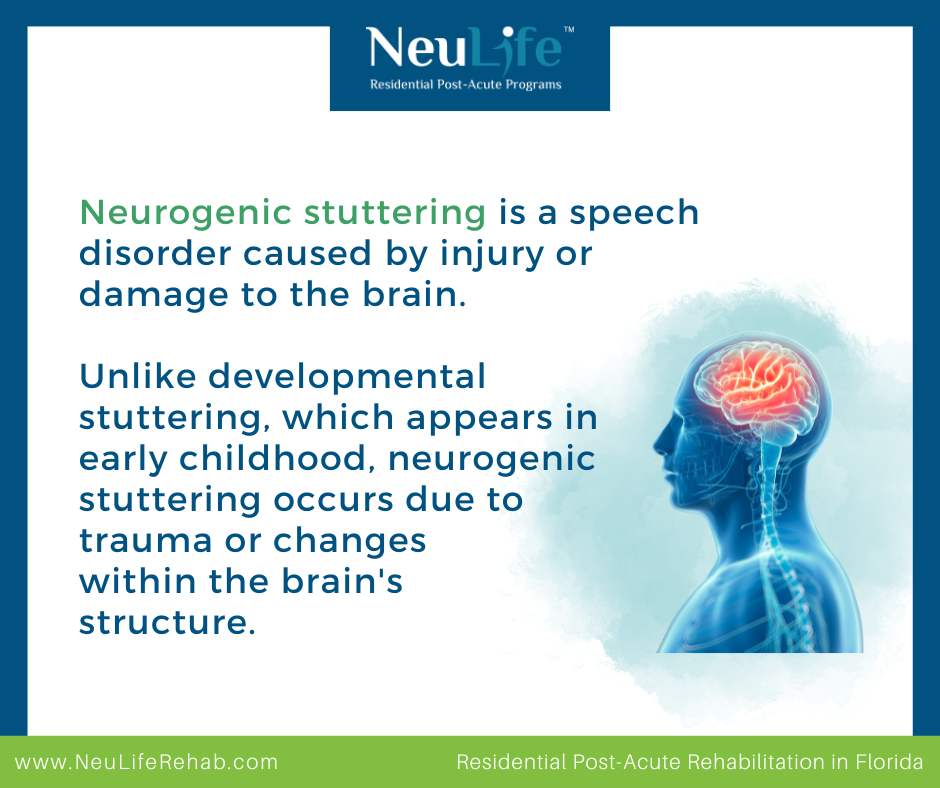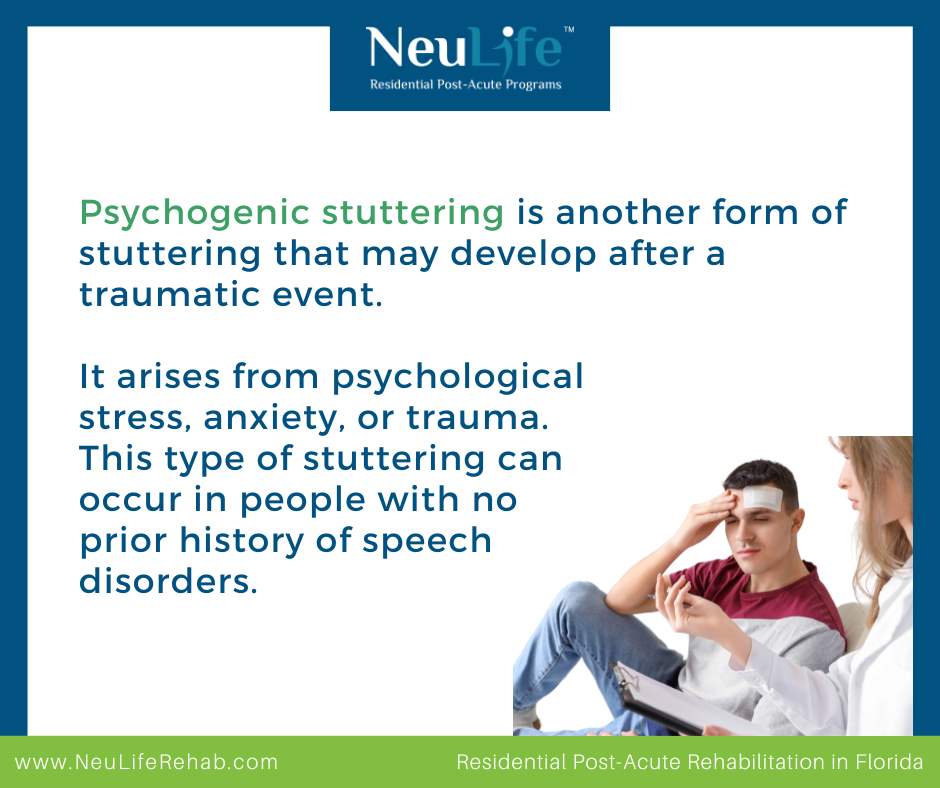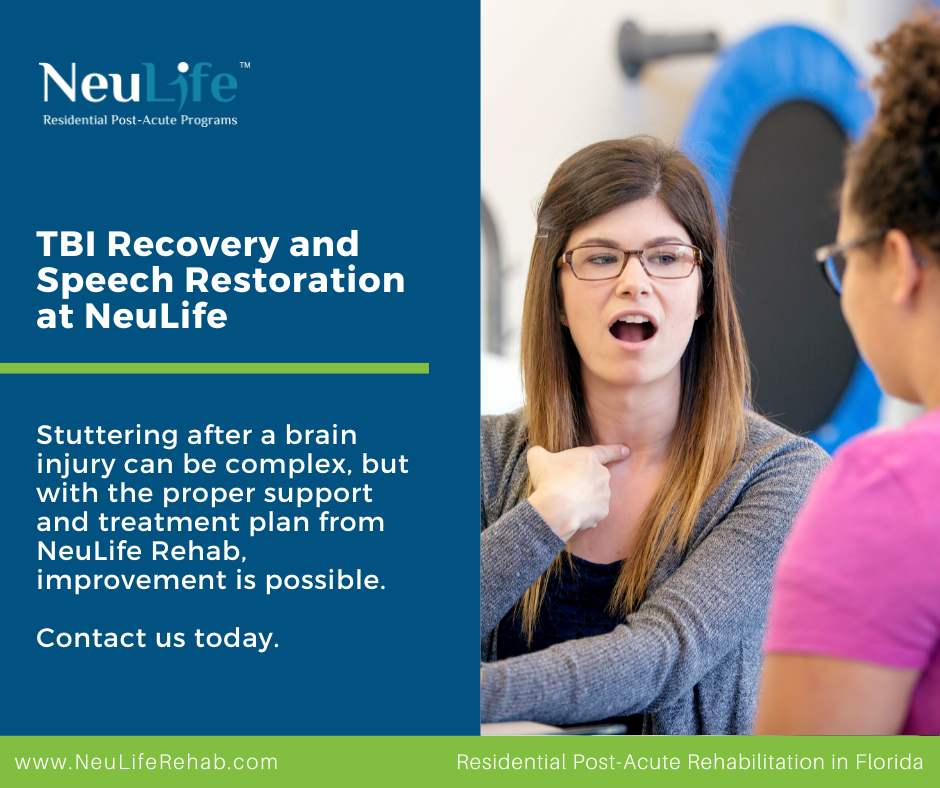Stutters are common speech disorders in early childhood, but they can also occur after a traumatic brain injury. Doctors refer to this type of speech impediment as neurogenic stuttering.

For many individuals, experiencing stuttering after an injury can be frustrating, impacting confidence and communication.
Understanding the causes and treatment options for neurogenic stuttering can make a significant difference in recovery.
Neurogenic stuttering is a speech disorder caused by injury or damage to the brain. Unlike developmental stuttering, which appears in early childhood, neurogenic stuttering occurs due to trauma or changes within the brain's structure.
Brain injuries disrupt the neurological pathways responsible for language processing, leading to disruptions in speech fluency. This stuttering may include repeating sounds, prolonging words, or experiencing sudden speech blocks. The condition can affect people of any age and varies widely in severity.
Common symptoms of neurogenic stuttering include:
Neurogenic stuttering may occur immediately after a brain injury or develop later. In addition to affecting communication, neurogenic stuttering can also impact social interaction and personal relationships.
The human brain is a complex network of interconnected regions that work together to produce fluent speech. Key areas involved in speech production include:
Brain injury can damage these areas, disrupting the intricate neural pathways that underlie fluent speech. Here are several factors that can contribute to stuttering after brain injury:
Injury to Broca's area, Wernicke's area, or the motor cortex can directly impair speech production.
Damage to the neural pathways connecting different brain regions can disrupt the coordination of speech movements.
Brain injury can affect cognitive functions like attention, memory, and executive function, indirectly impacting speech fluency.
Anxiety, frustration, and fear of stuttering can exacerbate the severity of the disorder.
Psychogenic stuttering is another form of stuttering that may develop after a traumatic event, though it is less common than neurogenic stuttering.
Unlike neurogenic stuttering, which stems from physical brain damage, psychogenic stuttering arises from psychological stress, anxiety, or trauma. This type of stuttering can occur in people with no prior history of speech disorders.
Psychogenic stuttering may appear suddenly and often coincides with intense emotional trauma or anxiety. For instance, individuals who experience post-traumatic stress disorder (PTSD) following a head injury may develop psychogenic stuttering as part of their reaction to the trauma.

Symptoms are similar to neurogenic stuttering but are often more variable. Some days, the person may experience severe speech interruptions, while other days may show significant improvement.
Treating psychogenic stuttering often requires a different approach than neurogenic stuttering, focusing on addressing the underlying psychological issues through therapy and counseling.
Effective treatment for neurogenic stuttering often involves a multidisciplinary approach, combining speech therapy, medication, and supportive therapies. The primary goal is to help the individual regain fluent speech or develop strategies to manage the condition more comfortably.
Here are some common treatments for neurogenic stuttering:
Speech therapists work closely with patients to develop techniques that improve fluency. This may include:
For individuals with psychogenic stuttering or those who experience stress-related speech issues, CBT can be beneficial. This therapy addresses the anxiety or stress surrounding speech, helping the individual cope with and reduce stuttering symptoms.
In some cases, medications may assist in reducing symptoms associated with neurological issues. While there is no specific drug to cure stuttering, medications for managing anxiety, mood disorders, or neurological conditions may provide relief and help improve communication.
Support groups offer individuals a space to discuss their experiences and gain confidence in communicating. Counseling can be especially valuable for those dealing with psychogenic stuttering or anxiety after a brain injury.
Some individuals benefit from devices that alter auditory feedback. These devices, worn in the ear, can help the speaker hear their voice differently, reducing stuttering frequency.
Stuttering after a brain injury can be complex, but with the proper support and treatment plan from NeuLife Rehab, improvement is possible.

NeuLife Rehabilitation is a premier provider of comprehensive rehabilitation services for patients who have suffered from traumatic brain injury (TBI) and its resulting conditions. We provide programs to suit each patient's needs—from post acute rehabilitation to speech therapy.
Our neuro rehabilitation center has a state-of-the-art facility and a highly skilled team of therapists, neurologists, and rehabilitation specialists. We provide unparalleled care to help patients regain independence, improve quality of life, and achieve their recovery goals.
NeuLife Rehabilitation isn’t just a place to recover; it’s a place to rebuild, renew, and regain independence.
Contact one of the best TBI rehabilitation centers today to learn more.
The material contained on this site is for informational purposes only and DOES NOT CONSTITUTE THE PROVIDING OF MEDICAL ADVICE, and is not intended to be a substitute for independent professional medical judgment, advice, diagnosis, or treatment. Always seek the advice of your physician or other qualified healthcare providers with any questions or concerns you may have regarding your health.

We know that choosing the next step in your recovery from a catastrophic illness or injury is complex. Together, we can help you take the next step.
Contact us with any questions today.